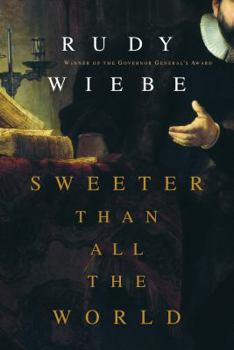Sweeter Than All the World
Select Format
Select Condition 
Book Overview
Rudy Wiebe s latest novel is at once an enthralling saga of the Mennonite people and one man s emotional voyage into his heritage and his own self-discovery. Ambitious in its historical sweep, tender... This description may be from another edition of this product.
Format:Hardcover
Language:English
ISBN:067697340X
ISBN13:9780676973402
Release Date:January 2001
Publisher:Knopf Canada
Length:448 Pages
Weight:1.50 lbs.
Related Subjects
Contemporary Fiction Humanities Literary Literature Literature & Fiction World LiteratureCustomer Reviews
1 rating
Rudy's Good Book
Published by Thriftbooks.com User , 22 years ago
If you like good writing, especially when it's grounded in real history, then you'll like Rudy Wiebe's Sweeter Than All the World.. He takes on the story of a Mennonite family over time, a nearly epic family chronicle covering more than five hundred years, and succeeds astonishingly well. The chapters alternate between the historical/fictional stories and the contemporary story of Adam Wiebe and his family The three epigraphs give the reader a good entry into the novel, especially one from the poet Joseph Brodsky: "You're coming home again. What does that mean?" Answering that question is not so simple for Adam Wiebe, the main character. We watch as he loses his childhood home, then finds a home with his wife and family, only to lose it again, partly through his own actions but also because, like the rest of us, he has cast himself adrift in an over-hyped, noisy and fragmented contemporary society. You don't have to be Mennonite to recognize the emptiness of Adam's a long period of self-imposed wandering and exile. He searches to find not just himself but also to recover what he has at the opening of the novel - a sense of being at home. When her parents separate, his daughter too becomes a global wanderer, trying to lose what she feels is the heavy burden of her family past. When she disappears, Adam's wandering takes on a double purpose as he tries to find both his daughter and a place for himself within a recovered family past. Home, for Rudy Wiebe, is not simply cast as a physical or geographical place and he makes no bones about the essentially spiritual nature of Adam's quest. In contrast to the wanderings of the earlier Mennonite families, forced by persecution and war, Adam's jaunts from lover to lover and airport to airport would seem almost trivial if they were not so painful for him and so familiar to us. As he did in The Blue Mountains of China, Wiebe's careful use of historical sources is convincingly interwoven with the voices of his semi/fictional characters. I enjoyed checking up on some of the historical references he cites at the novel's end and discovered just how historically accurate much of his "fictional" material really is. What finally knits the generations together here is storytelling. Their faith and beliefs, their lives, their accomplishments and their suffering are passed along in the family stories, a force for ill to the young Adam, but ultimately a powerful force good. Wiebe clearly believes that we need to strike a balance between forgetting the past and obsessing over it, and he comes down on the side of memory. His fictional Wiebe family finally shares the stories, not as a way of burdening the younger generation, but of a way of providing them with the roots they need to grow.





